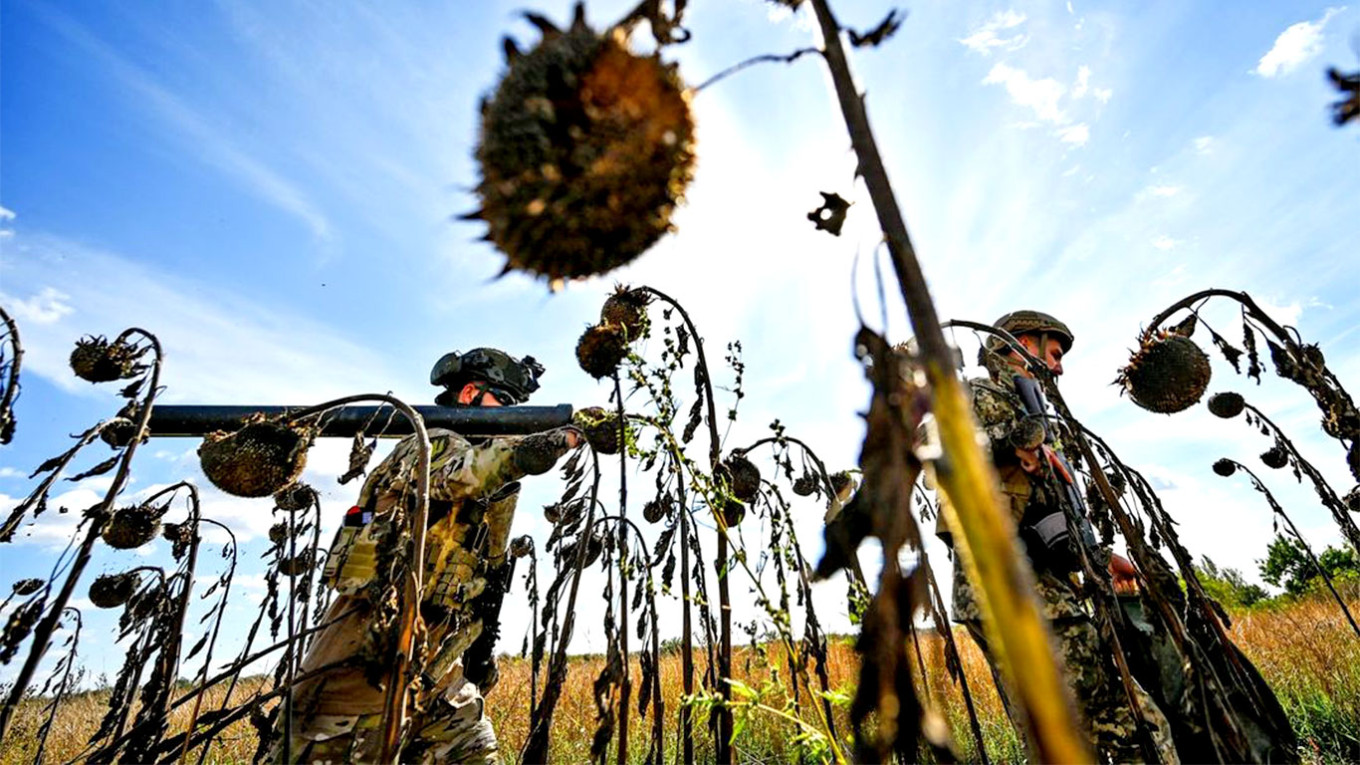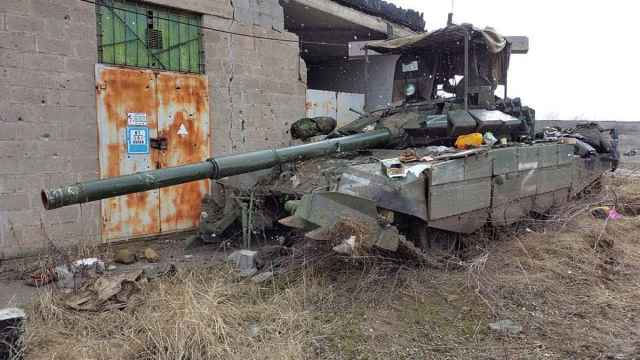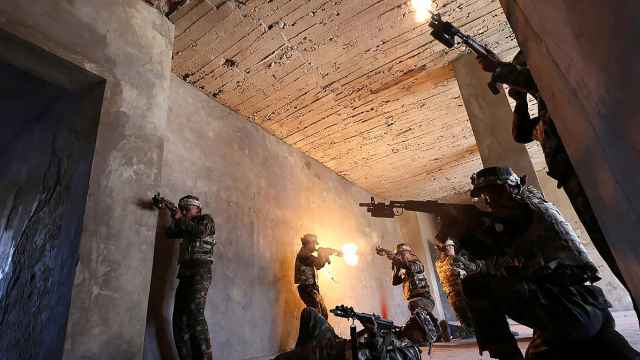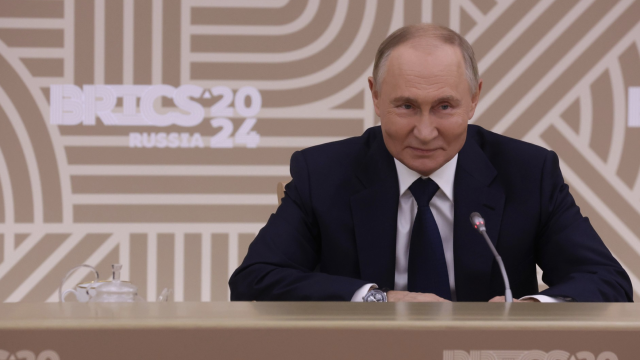As Kyiv’s counteroffensive stalls and a decisive Ukrainian victory looks increasingly unlikely, suggestions by some American experts that the United States should initiate peace talks between Russia and Ukraine may seem tempting. However these arguments are nothing but counterproductive in terms of ensuring a lasting peace in Europe and the world beyond.
The very statement that the U.S. should launch negotiations indicates that the author seeks to present the war as a purely regional conflict rooted in a land dispute between neighboring states. Such a reading is undoubtedly intended to reduce anxiety about the prospect of further escalations. Unfortunately, that understanding is far from the truth.
No matter how much Washington assures itself with the incantation that the U.S. is not a party in this conflict, Moscow assumes the opposite. For President Vladimir Putin, this war is the culmination of an epic and eternal confrontation between an independent Russia and its eternal enemy, the West led by the United States. In this context, Ukraine is not a sovereign actor, and Kyiv’s unilateral surrender is the only outcome Moscow will accept.
In the case of any negotiations, Putin will demand concessions and commitments primarily from Washington (and Brussels), not from Kyiv. The Kremlin has already demonstrated it will do this. Russian authorities explained their withdrawal from the grain deal by the failure of the Western countries to fulfill their conditions. However, Western countries were not parties to this deal; Russia, Ukraine and Turkey were. However, this fact did not prevent Putin from demanding concessions from the United States and Europe.
The problem behind all those “let’s start negotiations” initiatives which pop up is mainly that the U.S. administration has so far not explicitly stated its goals regarding the war in Ukraine. The U.S. has not yet said what it considers the optimal outcome to be. Statements that the U.S. is willing to support Ukraine for as long as it takes lack clarity, although such a mindset deserves respect and support. However, it doesn’t go far enough.
No definitive statements have been made by the United States on what such guarantees could look like or how Ukraine and NATO are going to build relations with post-war Russia. This sadly suggests that Washington does not yet understand what it wants to achieve from this war, despite having promised Ukraine all the necessary support.
In itself, the promise of support was certainly noble. However, it was also obviously made without consideration of the possible outcomes. The main consequence of such a decision is that Moscow perceives the United States as a direct participant in the war against "Russia's legitimate interests." This fact does not seem to be taken seriously in Washington.
It is the U.S. that has provided the lion's share of all military aid to Ukraine, enabling Ukrainian forces in 2022-23 to fight effectively against Putin's army. On the other hand, this support is still half-hearted, as shown in the ongoing discussion about sending fighter jets to the Ukrainian Air Force. The delivery of just two dozen HIMARS launchers in 2022 which significantly strengthened Ukraine's capabilities demonstrates how powerful U.S. support can be. However, this successful experience has not prompted the U.S. to increase deliveries of other necessary weapons, such as tanks and airplanes. Is this a reflection of the indecisiveness of decision makers in Washington or partisan infighting? More likely, it is the result of a lack of clear goals and objectives in their strategy.
We see that without supplies of modern weapons such as long-range missiles and aircraft, the touted Ukrainian counteroffensive is advancing with great difficulty. The failure of NATO members to throw their full weight behind Ukraine has given Russian troops plenty of time to heavily fortify occupied eastern Ukraine. Moreover, the Pentagon knew that Ukrainian troops were not sufficiently prepared, but thought that they could compensate for their lack of modern weapons through enthusiasm and high morale. This is absolutely unprofessional and irresponsible behavior, which puts the very success of the Ukrainian counteroffensive at risk.
This caution can largely be explained by the administration's constant fear of a possible escalation with Russia. A notorious example is the ultra-fast reaction of the U.S. and NATO countries to the falling debris of a missile of unknown origin in Poland in November 2022. If NATO officials anticipated having to retaliate decisively against Russia, they would have taken far longer to analyse the debris to determine its origins. In Moscow saw this as a sign it could continue to destroy the Ukrainian population and infrastructure with impunity.
The lack of material response from the U.S. to constant “unprofessional behavior” from the Russian Air Force toward U.S. aircraft over the Black Sea or in Syria does not help ease tensions as much as they might think. On the contrary: it further emboldens Russia, adding fuel to Moscow’s sense of impunity that in turn may lead to more serious incidents potentially fraught with uncontrolled escalation.
To repeat a cardinal truth: hostilities escalate precisely when one side sees that the fear of escalation is the main deterrent for their adversary. It is the fear of hypothetical Russian strikes on targets in eastern Europe that keeps both the U.S. and the Europeans from stepping up vital support for Ukraine. By doing so, they are playing in favor of Putin. Moreover, they are undermining the possibility of a Ukrainian victory.
Ukraine's defeat, and thus Putin's victory, would have unfortunate consequences for the United States. On a strategic level, it will undermine U.S. credibility as a dependable partner. It will also undermine its credibility as a manufacturer and supplier of modern military equipment, which has not helped against Russian troops armed with far less advanced weapons.
The United States’ unwillingness to openly confront a nuclear power will undoubtedly foment discontent within NATO. Who will guarantee NATO members in eastern Europe that the U.S. will come to their aid in a conflict with Russia, rather than merely condemning Moscow “in the strongest terms”? Why should Washington's stated commitment to Article 5 be considered more credible than its commitment to help Ukraine? In both cases the U.S. would have to confront an aggressive nuclear power.
Naturally, Putin’s victory in any form will embolden the many opponents of the U.S. and the collective West. The only way to avoid this situation is to defeat Putin in a serious, uncontested way.
There is a view that the U.S. wants Putin to be defeated anyway. But what does that mean? If defeat means a situation in which Putin accepts a disadvantageous ceasefire that gives him only a part of Ukraine rather than the whole of it, then it can hardly be called a defeat.
It is a great misconception to think that Putin cannot see any outcome of the war in which he retains even a small part of Ukrainian territory as a victory. Any Ukrainian land that remains under Putin's control will be presented to domestic and foreign audiences as a great victory for Russia and a humiliation for the U.S. and NATO.
It should not be underestimated that humiliating the U.S. is something many in the Global South are looking forward to. U.S. foreign and economic policy would have to contend with its consequences for years to come.
If Putin as an aggressor is free in what he can call his victory in the end, Ukraine as the defending party has no such freedom. For them, the criterion of victory is at least the return of the pre-war status quo.
Obviously, Ukraine and its Western partners will not be able to call a ceasefire or peace achieved through concessions to the aggressor a victory. Explaining that they had to give up Kharkiv and Kherson to Russia to avoid losing Kyiv and Odesa would mean they had to choose the lesser of two defeats. It is all the more important to fix the criteria clearly and unambiguously for success.
Putin's regime, after its victory, will continue its aggressive anti-Western course. To do so is natural for the fascist regime established in Russia. The Kremlin has exhausted all possibilities for economic growth. Russia now runs on fear and terror. Like any other fascist regime, it will look for ways to direct growing internal discontent and aggression outward.
Therefore, Putin's regime is a threat to peace which must be confronted. The West's primary goal, if it is interested in lasting peace in Europe, must be the end of the regime, not the mere defeat of Russian troops in Ukraine.
The only way to avoid escalation without any capitulation is to eliminate its source. The alternative is unconditional surrender to Putin, ceding to him all the Ukrainian territories he wants, and agreeing to all the demands that Moscow's strategists can come up with. Only then can the U.S. say they have avoided an escalation. And even then, they can only avoid escalation for a few years.
It is no secret that the Russian president regards all world politics as a battle between the strong and the weak. He views everything from the point of view of strength, which he perceives in its simplest form – as the ability to engage in direct violence. Initiating negotiations is, in this paradigm, a sign of weakness. The only negotiations that a strong party can initiate on its own are negotiations of unconditional surrender of its adversary, because anything else would be weak.
In any case, when the outcome of the war has not yet been fully determined and the scales may tip in different directions, expressions for a willingness to negotiate would be interpreted by Moscow as evidence that the country proposing negotiations considers its position to be weak. In such a situation, Moscow may not reciprocate, but will keep pressing to make the conditions for these negotiations at least even more favorable and, ideally, to break their enemy's resistance completely.
If we take the idea that the U.S. should somehow scare Putin and thereby force him into negotiations favorable to Ukraine and the West, we’re faced with the question of what such threats that Putin could take seriously would look like. New sanctions and an economic blockade? This does not look realistic today, given that the current sanctions regime has many loopholes and lacks unanimous support. Threats from Washington to Moscow must be serious and tangible. But if it comes to military measures against Russia, why should Putin believe U.S. intentions are serious if it has been avoiding any possibility of an armed conflict so far?
All the initiatives calling for peace talks send Moscow a hugely different message than their authors hope for. They signal that all Russia needs to do is wait, and the West will finally retreat, exchanging a bleeding Ukraine for the preservation of its own usual comfort.
Finally, we should not forget that Putin appears to believe that time is on his side, and that the Russian economy has learned to cope well with sanctions. There is no unity among Western countries, and the next U.S. administration may well not be as resolute.
Russia is actively preparing its army, continuing to mobilize with upgraded weaponry. Russian commanders expect to resume active operations, receiving hundreds of thousands or even millions of new soldiers. Given the insufficient level of military aid from the West, there is a risk that Ukraine will have nothing to oppose this and its forces will become overwhelmed.
Thus, Putin only needs to wait for Ukraine to eventually fall into his hands.
It is time for the U.S. to make a clear decision about whether it supports Ukraine and, by extension, Western democracy and rules-based order from violent revision. Or, on the other hand, whether it has made a mistake by agreeing to help Ukraine, in which case it should urgently make peace with Putin (neglecting the fact that the billions of dollars of the U.S. taxpayers spent on helping Kyiv have been actually wasted).
The goal of the war for Ukraine, and the West as a whole, should not just be a military victory in Ukraine. Rather, they need a global defeat of Putin's regime and to banish it from the world stage.
To this end, the following steps would be required. The U.S. must abandon its half-hearted arms supply policy and provide Ukraine with all the necessary weapons as soon as possible. It must lift the ban on hitting military targets deep inside Russian territory and untie the hands of the Ukrainian military, given that the Russians do not restrict themselves in the same way. Finally, the U.S. has to clearly state that it is Putin himself who is the enemy of Ukraine and the West and to offer a vision of future relations without Putin – a vision potentially acceptable for both Putin’s own elite and Russian pro-democratic forces. Engaging with the Russian opposition movement could be instrumental in fleshing out such a vision.
The Big War seems almost inevitable. Only a swift and crushing response from the West to the Russian aggression at the very beginning could have prevented future wars. That chance was wasted. The line hesitantly toed by the West for over one and a half years has only made a future war more likely. China is gathering strength while helping Putin to distract Washington, so Beijing gets as much time as it requires to arrange a more promising campaign to take Taiwan once and for all.
Autocrats all over the world are getting the same message – if they prepare better than Putin they may very well succeed in conflict against the West, who simply lack the courage and desire to protect themselves and their allies.
To avoid the worst-case scenario of an open war, one must act decisively and hard, showing your adversary no fear and great confidence in your strength. Putin and his ilk can only be impressed by a show of determination, not of constant hesitation.
Today it is time to correct, as far as possible, this grave mistake by the West. Tomorrow may be too late.
A Message from The Moscow Times:
Dear readers,
We are facing unprecedented challenges. Russia's Prosecutor General's Office has designated The Moscow Times as an "undesirable" organization, criminalizing our work and putting our staff at risk of prosecution. This follows our earlier unjust labeling as a "foreign agent."
These actions are direct attempts to silence independent journalism in Russia. The authorities claim our work "discredits the decisions of the Russian leadership." We see things differently: we strive to provide accurate, unbiased reporting on Russia.
We, the journalists of The Moscow Times, refuse to be silenced. But to continue our work, we need your help.
Your support, no matter how small, makes a world of difference. If you can, please support us monthly starting from just $2. It's quick to set up, and every contribution makes a significant impact.
By supporting The Moscow Times, you're defending open, independent journalism in the face of repression. Thank you for standing with us.
Remind me later.








